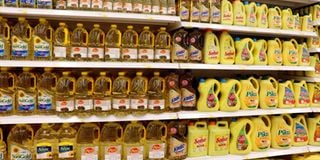Premium
Cooking oil prices could rise further

Different brands of cooking oil on sale at Carrefour Mega on Uhuru Highway in June 2020.
Cooking oil prices could rise further in the coming days amid fears of looming shortages, the Nation has learnt.
The biting dollar shortage and limited exports of palm oil from Indonesia, the world’s biggest producer, are likely to worsen the situation. There has been a 28.6 per cent increase in cooking oil prices since February, with a litre now retailing at Sh445.
While some manufacturers have scaled down production, no edible oil imports are expected in Kenya between now and June 20. Cooking oil production companies say the dollar crisis, the war in Ukraine and the ban on exports by Indonesia have hampered the importation of raw materials used in production of cooking oil.
The Kenya Association of Manufacturers (KAM) edible oils sub-sector said it imports raw materials worth Sh11 billion monthly.
“The scarcity of foreign currency has hampered local manufacturing. Our factories need the currency to import raw materials. The edible oils sub-sector has been heavily impacted. We import thousands of metric tonnes of crude oil each month. It, therefore, needs more than $100 million every month,” said Mr Abdulghani Alwojih, the sub-sector chairman.
Ukraine is Kenya’s top supplier of sunflower oil, while the drought in South America has increased prices of soybean oil, which is usually an affordable alternative.
According to the Mombasa port schedule, of the 14 vessels expected to dock between June 6 and 20, none will be shipping in palm and vegetable oil. Fourteen will be carrying containerised cargo: Cars (six), clinker (two), bagged rice (one) bulk wheat (one), fertiliser (two) and steel products (two).
Kenya Ports Authority records show that palm oil and vegetable oil was last shipped in on May 19, via MV Maritime Venessa and MV Navigating 8 Guard.
“Given the prevailing challenges, Pwani Oil has temporarily halted operations at its refinery in Kilifi as we work to resolve the problem. We, however, wish to assure our customers, employees, suppliers, partners and other stakeholders that this is a temporary measure and the business remains in operations and our products available in retail outlets,” said Pwani Oil commercial director Rajul Malde.
A litre of cooking oil in the country has moved from Sh346 in February, Sh430 in March, Sh408 in April to Sh455 in June. This has come up from Sh303 per litre last year and Sh206 in 2020, meaning the price has more than doubled over the past two years (a 116 per cent increase).
Ironically, different brands of the product are having promotional sales in supermarkets, a situation that remains unclear on how the sellers are affording, if indeed they are either facing challenges accessing raw materials or importing them at high prices.
At Naivas Supermarket’s Moi Avenue branch in Nairobi, the Nation confirmed that some Fresh Fri products displayed near the entrance were selling on promotion.
At Quickmart’s Tom Mboya Street branch, two-litre Pika cooking oil products had been displayed at the entrance and advertised for promotional sales, selling at a lower price (Sh781) compared to other brands. Five-litre Avena cooking oil products also sold at promotional prices in the Quickmart branch, at Sh1,740.





